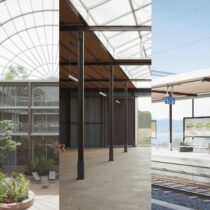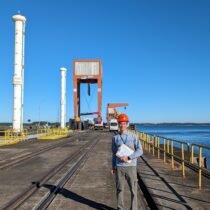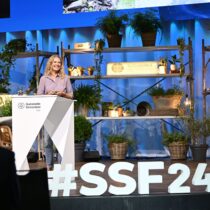Unexpected Journeys: My Path from Flight Attendant to Environmental Scientist
June 27, 2024The Catalyst for Change
Hi! My name is Bettina and I recently graduated from ETH in environmental science and policy. How on earth did I get here? It was actually more of a coincidence than a planned step in my career, much like getting into politics at a young age.
How so? After having flown as a flight attendant for two years, I figured I wanted to do something that felt more purposeful than tending to passengers’ needs even though I did feel a sense of purpose at times– for example when I tended to people who were part of an American immigration project: They saw electronics for the first time in their life and had to be told how to plug in headphones; and a mom had to be helped who had never used a diaper for her children before.
Without giving it much time and thought, I met someone who had studied the same. It sounded interesting along with the allegedly pleasant, cooperative mindset of people who went for the same studies. My career advisor told me to rather go for some hard science, like maths or biology and do an MBA afterwards, because environmental science was nothing really concrete, scratching the surface of a lot of topics.
Academic Pursuit at ETH
Well, he was right about that part. To show how vaguely defined the studies are in peoples’ minds, this is what a different set of people think I do as an environmental scientist:

Jokes aside, what environmental studies allow you is to get the fundamental basics of all hard sciences and learn to think systemically. That I see as the main benefit of my studies: the way we learned to think.
What do I mean by that? While a biologist might see the ecological niche for a certain species, the geographer sees how that certain ecological niche came about, the mathematician delivers the tools to calculate and measure it, an environmental scientist needs to understand all these factors on a general level, make the connections and often apply it to human life.
Real-World Application and Discoveries
Last week, I was discussing with the professor of quaternary geomorphology (glaciers and how they formed our landscape), how gravel pits have been filled around Zurich. Imagine Regensdorf, which is densely populated now, had to fill up its gravel pits to make room for
settlements. Now instead of taking any kind of cheap material, what has been done is to take gravel material from digging holes for houses (from nearby places). How neat and efficient and cost-effective a solution is that? These are things that get me excited: concrete, effective solutions to real-world problems.
My professor, seeing my awe, said: “We quaternary geologists get really frenzied up by looking at rocks and analyzing them and this is what excites you.” Nice to see how people and their knowledge complement each other.
Challenges Along the Way
Because of being uncertain whether I was learning something that could actually serve my initial goal, moving towards doing something “more purposeful”, along with little vacation and tight requirements of ETH, I seriously thought about quitting several times. But I pushed through and I’m glad I did. One important factor that kept me going were the regularly occurring excursions where what was learned could actually be applied and put into practice to make a difference in real life. Or attending ETH week, where basically a group of overexcitedly motivated nerds works on a project about a real-world problem for a week.
At this point, I would like to point out a rather inconvenient truth – studying at ETH is tough and a shocking high number of people studying with me actually went into burnout, even I was close to it at some point and my counsellor back then was wondering what was going on at ETH, because she allegedly had many clients from ETH. Having said all that, it is reassuring to know that this problematic is addressed with projects such as wie gETH’s? by VSETH. This is a representative study about mental well-being at ETH, for students and employees alike and had been done already in 2018. The results led to improvements to tackle exactly aforementioned problematic, e.g., more peer-mentoring programs or changes in study regulations.
Career Reflections and Opportunities
So where do I stand now, after my studies? Let me explain first how I came to today: along with family planning (I am a mom), I was trying hard to choose the right career path.
ETH offers many great opportunities to help shape this decision. Such as doing programs at the FAO in Rome (for editors: picture 2), or in my department, D-USYS, being relatively free to choose the direction of one’s thesis. I was always interested in development and cooperation, so I went for it and thanks to that I figured out that this sector/world is not for me, the reasons for which would go beyond the bounds of this blog post.

Another route I was taking, was due to getting into an entrepreneurial program (again by chance), rooted in ETH. I learned a lot of essential things (how to “think business”, something that just didn’t fit in our curriculum, but would be vital in a capitalist world) that I know I will use later in my life.
Another thing I was wondering about, was whether to go into consulting, as I do feel the need to bring across what I actually learned. I found it intriguing, but not easily combinable with being a mom.
However, coming from ETH, I got into consulting recruitment events fairly easily, so I could attend the Sustainable Switzerland event last year and even briefly meet Gro Harlem Brundtland, a sustainability legend, due to her chairing the UN commission which defined the term “sustainable development” in 1987 as it is used today.

I also felt at the conference, which was more of a business and less academic setting how prestigious our institution is regarded. It said BCG and ETH on my name tag, and people treated me differently than they use to without this specific name tag, they came and talked to me! This never happened at another conference before – it seems like the hard work of the last half decade is paying off in some sense at least. 😉
So, consulting wasn’t the right path either, how did my career continue then? Again, by chance, in my last master’s year I was asked to substitute as a high school teacher. This is something that feels purposeful, aligned with my talents, and combinable with being a mother: Becoming a teacher for young people who want to learn something and guide them in a sense, trying to bring across systemic thinking and also thinking out of the box while hopefully making them excited about science.
So, this is where ETH has taken me for now. I will start off learning how to teach people (yes, ETH also offers a teaching diploma) and trying to become really good at it, while I will keep one foot in the sustainability scene. To all you readers out there – do you have any projects in the sustainability scene and feel like I could contribute? Please reach out to me at: bhaenny@ethz.ch .
Looking Ahead
Whoever of you knows Richard Feynman’s famous “Six Easy Pieces: Essentials of Physics Explained by Its Most Brilliant Teacher» might remember that he proposed the following: If we were to only pass on one scientific principle to next generations, it would be about the principle that everything is made up of the same set of particles.
Why on earth do I bring this up? Well, to me it feels like ETH – metaphorically speaking – has given me the knowledge that everything is made up of particles. So now I have the privilege to know what I need to explore the planet and find where, with my talents, I can be content and best contribute.





